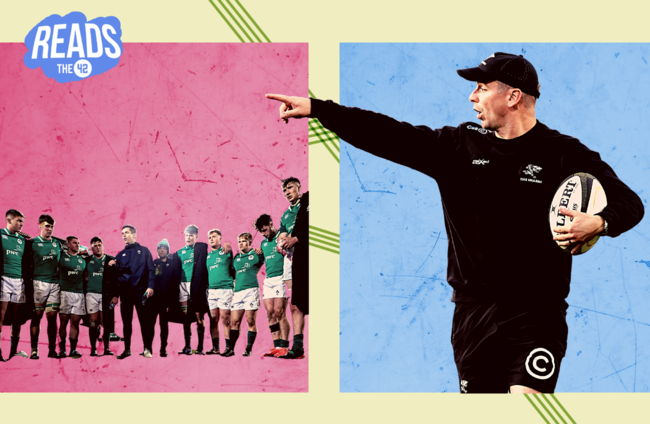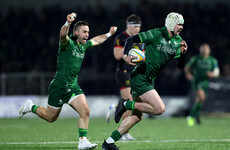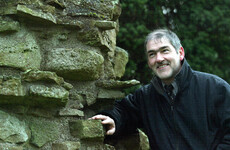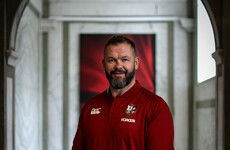A MEMORY CAME through the letterbox. Inside an envelope was a colour photograph of a team he used to coach. The faces were stubble free and innocent; the plain, collared jerseys a reflection of an Ireland that was poor and unspoiled. A letter accompanied the picture, sketching out an east Clare childhood in a series of idyllic scenes.
They played soccer on muddy pitches and in open parks, in dank Novembers through to green and blue summers. They were from a small village, these Davids, the townies from Ennis impersonating the big, mouthy Goliaths. David may not have possessed a sling but he had his own ‘Supermac’, a farmer’s son from ten minutes out the road, who was devastatingly quick and skilled.
‘Supermac’ was Noel McNamara, now the rising coach that everyone in Irish rugby is talking about, then a kid who hurled, ran cross country, played soccer, golf, badminton, participated in every sport really, except rugby.
You can see him in this photo, third from the right in the back row, wilful and free. Patrick Donnellan, who would go on to captain Clare to their 2013 All-Ireland senior hurling title, is third from the right in the front row, three years younger than the rest of them, utterly fearless.
The man in the back row, with the diamond jumper, was their guide and coach. “A great man,” says McNamara of his childhood mentor, Gerry Buckley. “As a child you don’t think too deeply about things.”
But as an adult you do. You remember the little gestures, the pound note each man of the match received; the trips to the chipper after games; the constant encouragement.
“It shaped me, those games,” says McNamara. Gerry, his coach, was a Mullingar man, but work had taken him to Clare for a couple of years. That was when soccer in Kilkishen took off. They’d win a county cup; reach another final, punch way above their weight.
The more established town teams from Shannon and Ennis initially didn’t respect these little guys and that’s why Gerry stayed with the team. Work had taken him back to Westmeath but for two years he commuted to Clare at his own expense; saw the Kilkishen boys through underage soccer, felt the glory of their big wins, the hell of losing penalty shoot-outs. “He coached us about life not just football,” says McNamara.
- See sport differently with The42 Membership and get closer to the stories that matter with exclusive analysis, insight and debate. Click here to find out more>
So, years and years later, when a letter arrived through the post, Gerry remembered names and faces. The author was one of McNamara’s team-mates who thanked his old coach for everything he’d done, getting the team up from nothing, providing them with a lifetime’s worth of memories. Then there was a line right at the bottom of the letter.
“Remember Supermac?” the author wrote. “He’s the Ireland rugby Under 20s coach now. They are just after winning the grand slam.”
“He’s after doing what?” Gerry thought.
He’d watched the decisive game the previous Friday on RTÉ. “So, that’s the same Noel McNamara,” I said to myself. “Jeez, I was stunned. Like, he was incredibly driven as a kid, sincere, attentive, coachable; likeable. I knew he’d go places.”
But he never thought it’d be to rugby. Certainly he couldn’t believe it’d be to Durban, South Africa, where today he’ll coach the Sharks in the United Rugby Championship quarter-final. For some, it sounds outlandish, how a farmer’s son from Clare could end up as an educator in a sport he never played. But when fate and passion collide, strange things happen.
He came to rugby just after the game went pro. He got lucky. A college degree in Law and European Studies didn’t float his boat so he switched after a year to study P.E. knowing teaching was where his future lay, even if the money wouldn’t have been as good.
It was the smartest choice he made, because it put him on a path to meet PJ Smyth. PJ had a link to Eddie O’Sullivan. PJ knew rugby and knew a person’s potential. In McNamara he saw a mirror image of his younger self, putting him on a path to learn about rugby and the decision-making process elite athletes make.
He’d give McNamara envelopes stacked with research papers. Once it was a document filled with notes from seasoned tennis players who had cameras attached to their heads, to help them figure out what they were seeing. Was it the racquet, the opponent’s body, the opponent’s face? Another day, another document; this paper written by fighter pilots who had undergone training programmes around the decision processes they go through.
Between them, Smyth and McNamara transferred these concepts into a rugby context. “That was my awakening,” McNamara says. “PJ saw the game through different eyes to most in Irish rugby back then. Forwards should be able to pass as comfortably as backs, he believed; backs should be capable of being a jackal threat. Nowadays this is a given; back then this was a vision.”
The tutor also had a vision for his pupil. He guided him through college, helped him land his first job and while McNamara calls himself an accidental coach, in truth, he’s anything but. A coach is drawn to a rugby field like moths to a light; they live their lives through a different set of norms. So, to mere mortals, the idea of sitting down in your front room at 11pm to scroll through three hours of gametape might seem a tad excessive, to coaches, the shortening of their sleeping hours is simply part of a daily routine.
This was the life he chose for himself when college finished. By now he was teaching, in Glenstall, Limerick. The Under 14s needed a dig out and while the person they turned to had no playing CV to talk of, but did possess something much more useful: fearlessness. “I was unbelievably open-minded,” McNamara says. “I didn’t have a set view on how the game should be played. But I had no fear of failure. ‘How do I fail?’ I asked myself. ‘There is no expectation of me’.
“In any case, failure isn’t anything that defines you; ultimately it is your reaction to failure and what happens after that that defines your whole life. I’d be very clear on that.
“When you train, you actually need to have a certain level of failure because if you don’t, you aren’t getting better. But the environment has to exist where there should not be any fear of mistakes.”
That has existed right through his rugby life, firstly with the under 14s at Glenstall, later in his next teaching post at Clongowes, then in the Leinster academy and with the Irish Under 20s side, most recently with the Sharks, who he joined last July as their attack coach.
The best coaches, though, know that niceness has a boundary. While it is all well and good to possess empathetic qualities, unless you also have an edge to your personality, you’re really just a cheerleader with a clipboard and pen.
That was why the discovery of McNamara’s attitude to sloppy errors – ‘unacceptable’ – was informative; why he knows he must look kindly on a player’s struggle but be cold-hearted enough to realise there has to be a cut-off point. “If the person can’t change, then you change the person.”
This is a three dimensional character, we’re writing about, one who realised from an early age there was a world beyond the garden gate in Clare. In many ways he had it made, the secure job in a fee-paying school; the guaranteed pension, the freedom to pursue his passion for coaching away from the stress of a volatile profession.
Yet he gave all that up when a conversation with Les Kiss – the London Irish coach – triggered something in his mind. “An element of risk can make you better,” Kiss told him. More than that, McNamara had to be true to himself. He was always telling his pupils to follow their dream. Now he had the chance to do just that.
That’s why he took the call from the Sharks, why he said goodbye to the teaching profession, why he and his wife sat with their three children to say they were moving house. “In fact, we are moving to a different continent,” he informed them.
We can only imagine how that played out with his three daughters.
But if art does truly reflect life, then we have an idea.
There is this scene from Friday Night Lights, Peter Berg’s drama about high school football in a small Texan town, where the coach’s daughter, Julie Taylor, overhears her parents having a conversation about her father’s job offer in a faraway city. “Oh great,” the 15-year-old daughter says. “We’re moving again.”
The camera captures the subtle change of expression on the father’s face, as joy turns to confusion. The audience can guess his thoughts. “How is my dream not hers?” Julie turns and walks away. “The door’s going to slam,” Eric, the father, the coach, exasperates.
Sure enough, the last thing the audience hears before the titles roll is the bang of a door, and everything about those little moments, the shooting of a programme in a real Texan house, with everyday furniture and gaudy lamps, allows your mind to drift beyond a football field.
We don’t just see a coach; we see a dad. We learn about an angst-ridden teenager, a wife torn between being happy for her husband and concerned for her daughter. We see their suffering, the effect mortgage repayments have on their lives, how a better-paid job can ease those issues.
There’s one difference: In series one of the show, Taylor had just one child. McNamara has three.
You guess telling them about the South Africa relocation was a tough conversation. Certainly the one he had with his father, telling him he was leaving teaching as well as Ireland behind, brought a reminder of the no-nonsense world he grew up in.
“You are doing what?” my dad said when I first told him.
“To him, me giving up the pensionable job, that was the ultimate definition of lunacy.”
Yet he did it.
“Coaching for me is an addiction,” McNamara explains. “I love it, I crave it. Now obviously you can coach at different levels, and it can be very fulfilling. But I want to go to the highest level I can. Plus there is another thing. Every player I have ever coached always got the same message: leave no stone unturned to be the best possible version of you.
“If that is the message you are giving, then you have to lead by example.”
The good news is the girls have settled in Durban and a few weeks ago all three of them were in their dad’s office at the Shark Tank, Kings Park. “It was carnage,” McNamara says.
The look on the Sharks’ forwards coach, Akvsenti Giorgadze, confirmed McNamara’s assessment.
“Noel,” Giorgadze dead-panned, “is this happiness?”
“Well, for me, happiness is seeing a team get better, seeing them score tries, winning, understanding the work you put in has an output.”
But teams don’t always win. Even very good ones, like Leinster, taste defeat. The Sharks have had that taste six times this season, three times in the first four weeks of the season.
That’s the tricky part of being a coach, stopping yourself sulking when you walk through the front door, stopping yourself obsessing over the try that wasn’t scored, the game that was not won. That’s when you stop and recognise the sacrifices Sinead (his wife) and the girls have made.
Stuart Lancaster used to tell him this story, about how the life of a coach is one where you have to juggle three glass bowls in the air; work, family life, and your health. “Make sure none drop,” he advised.
He works hard to get the balance right, referencing a piece of advice Joe Schmidt gave him after reading Stephen Covey’s book, ‘the seven habits of highly effective people’. “There is a story in it about how in this life you have big rocks, gravel, pebble and sand, and basically you have to put them all into a jar. Now the only way you can do it is by putting your big rocks in first, then your gravel, your pebbles and your sand.
“In life you take care of your big rocks first and those, unapologetically for me, are family and work. And if other things drop off then so be it.
“In any case, kids have an amazing habit of putting things in context. I came home after our early season tour of the UK.
“My eldest daughter greeted me with a question: ‘how many games did you win, daddy?’
- “Only one.”
- “Well, why didn’t you win more?”
“It was a great question and the truth is because we weren’t good enough.”
The following week he showed his Sharks players a clip of Brian Cody speaking after an All-Ireland defeat. “It wasn’t the referee, it was not the rub of the green; we just were not good enough,” Cody said. The point McNamara was making was simple. Forget travel, forget the difficulties caused by lockdown. “As soon as we accept we weren’t up to scratch, we can get busy getting better.”
The players listened. They’re certainly a different team to what they were at the start of the season, deservedly reaching the quarter-finals. A McNamara reunion with Leinster is on the cards if both teams win today.
Beyond that, who knows where this rugby journey will take him? All we know is he carries big ambitions and the motto of John Wooden, the legendary basketball coach. “Achieve what you are capable of achieving,” he says, quietly. “We should not be afraid of those challenges.”
He never has been.
See sport differently with The42 Membership and get closer to the stories that matter with exclusive analysis, insight and debate. Click here to find out more>















Great read Garry. Best of luck to him living the dream….
Very good article. I wish him and his family the very best of luck